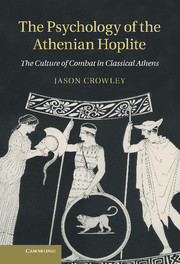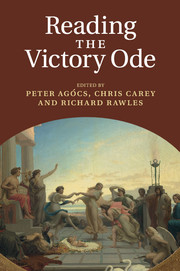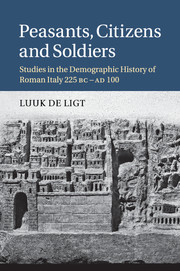Refine search
Actions for selected content:
23990 results in Ancient history

The Psychology of the Athenian Hoplite
- The Culture of Combat in Classical Athens
-
- Published online:
- 05 October 2012
- Print publication:
- 02 August 2012

Reading the Victory Ode
-
- Published online:
- 05 October 2012
- Print publication:
- 09 August 2012

Peasants, Citizens and Soldiers
- Studies in the Demographic History of Roman Italy 225 BC–AD 100
-
- Published online:
- 05 October 2012
- Print publication:
- 05 April 2012
Acknowledgments
-
- Book:
- Alexander the Great
- Published online:
- 05 November 2012
- Print publication:
- 28 September 2012, pp ix-x
-
- Chapter
- Export citation
Suggested Readings
-
- Book:
- Alexander the Great
- Published online:
- 05 November 2012
- Print publication:
- 28 September 2012, pp 185-186
-
- Chapter
- Export citation
Map 1: European Greece, Macedonia, and Northern Lands
-
- Book:
- Alexander the Great
- Published online:
- 05 November 2012
- Print publication:
- 28 September 2012, pp xiii-xiii
-
- Chapter
- Export citation
3 - The Danger in Replacing a Murdered Father as King (337 to 335 BC)
-
- Book:
- Alexander the Great
- Published online:
- 05 November 2012
- Print publication:
- 28 September 2012, pp 35-52
-
- Chapter
- Export citation
Frontmatter
-
- Book:
- Alexander the Great
- Published online:
- 05 November 2012
- Print publication:
- 28 September 2012, pp i-v
-
- Chapter
- Export citation
Index
-
- Book:
- Alexander the Great
- Published online:
- 05 November 2012
- Print publication:
- 28 September 2012, pp 187-193
-
- Chapter
- Export citation
5 - Finding God in Egypt and Capturing the Riches of Persia (332 to 330 BC)
-
- Book:
- Alexander the Great
- Published online:
- 05 November 2012
- Print publication:
- 28 September 2012, pp 73-92
-
- Chapter
- Export citation
2 - Opportunities and Risks asa Teenager (340s to 338 BC)
-
- Book:
- Alexander the Great
- Published online:
- 05 November 2012
- Print publication:
- 28 September 2012, pp 19-34
-
- Chapter
- Export citation
1 - The World of Alexander's Birth and His Education in Literature and Warfare (350s and 340s BC)
-
- Book:
- Alexander the Great
- Published online:
- 05 November 2012
- Print publication:
- 28 September 2012, pp 1-18
-
- Chapter
- Export citation
Contents
-
- Book:
- Alexander the Great
- Published online:
- 05 November 2012
- Print publication:
- 28 September 2012, pp vii-viii
-
- Chapter
- Export citation
9 - Returning to Babylon and Becoming Divine (326 to 323 BC)
-
- Book:
- Alexander the Great
- Published online:
- 05 November 2012
- Print publication:
- 28 September 2012, pp 149-166
-
- Chapter
- Export citation
Introduction: The Goal of this Book
-
- Book:
- Alexander the Great
- Published online:
- 05 November 2012
- Print publication:
- 28 September 2012, pp xi-xii
-
- Chapter
- Export citation
Map 2: Alexander's Expedition
-
- Book:
- Alexander the Great
- Published online:
- 05 November 2012
- Print publication:
- 28 September 2012, pp xiv-xiv
-
- Chapter
- Export citation
6 - Winning the World as King of Asia (330 to 329 BC)
-
- Book:
- Alexander the Great
- Published online:
- 05 November 2012
- Print publication:
- 28 September 2012, pp 93-112
-
- Chapter
- Export citation
10 - Remembering and Judging Alexander (323 BC to Now)
-
- Book:
- Alexander the Great
- Published online:
- 05 November 2012
- Print publication:
- 28 September 2012, pp 167-184
-
- Chapter
- Export citation
4 - The Opening Battles Against the Persian Army (334 to 332 BC)
-
- Book:
- Alexander the Great
- Published online:
- 05 November 2012
- Print publication:
- 28 September 2012, pp 53-72
-
- Chapter
- Export citation
7 - Murder, Marriage, and Mixing Customs in Afghanistan (329 to 327 BC)
-
- Book:
- Alexander the Great
- Published online:
- 05 November 2012
- Print publication:
- 28 September 2012, pp 113-130
-
- Chapter
- Export citation
